However, half of those surveyed across 34 countries describe the quality of their country’s healthcare service as good.
Site editor:
Joaquim Cardoso MSc.
The Health Strategist — Journal
September 30, 2022
Ipsos
26 September 2022
The Ipsos Global Health Service Monitor is an annual study that explores the biggest health challenges facing people today and how well-equipped people think their country’s healthcare services are to tackle them.
We ran the survey in 34 countries between 22nd July and 5th August 2022 on Ipsos’ Global Advisor online platform.
Key findings include:
Overview
- For a third year, Coronavirus remains the biggest health problem facing people around the world (47% globally, down from 70% in 2021).
- Mental health (36%) has experienced a 5-point increase from 2021, making it the second biggest concern.
- For the first time Mental health is ahead of cancer (34%) which is now third.
- Public perceptions of healthcare services are still holding up well:
– half rate their countries service positively, and
– 53% believe they will receive the best treatment. - Despite this positivity, only a third (33%) think their healthcare service will improve over the coming years …
- … and there is agreement that the system is overstretched (61%) with access and not enough staff as the biggest challenges (42%).
Healthcare Challenges
In conjunction with this mood that systems are overstretched, we see that access to treatment/waiting times emerge as the main perceived problems their country’s healthcare system faces — selected by a global country average of four in ten.
- Not enough staff is joint first for the first time since we started asking these questions in 2018.
- Cost of accessing treatment is the third most selected issue globally (31%).
- While no country has bureaucracy as their top healthcare challenge, it is widely recognised among the main issues.
Infographic:
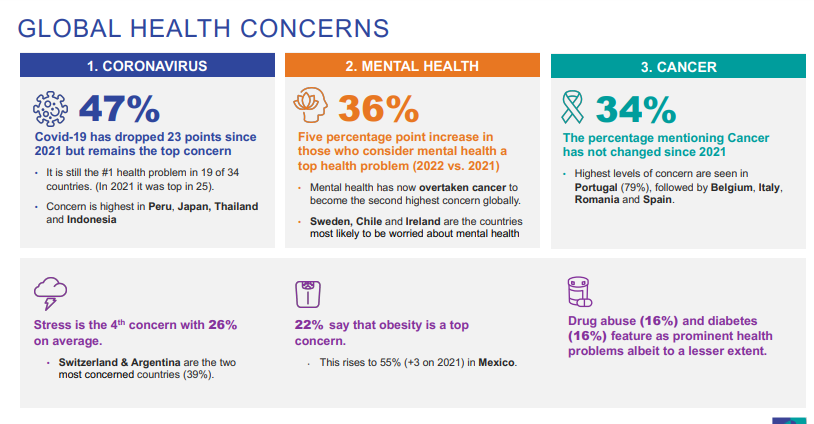
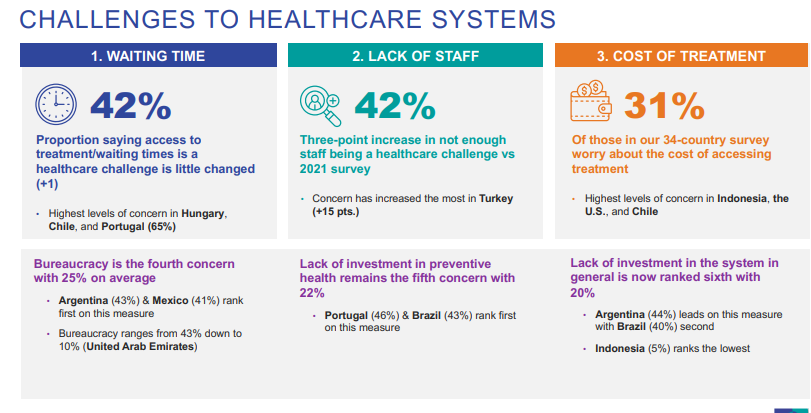
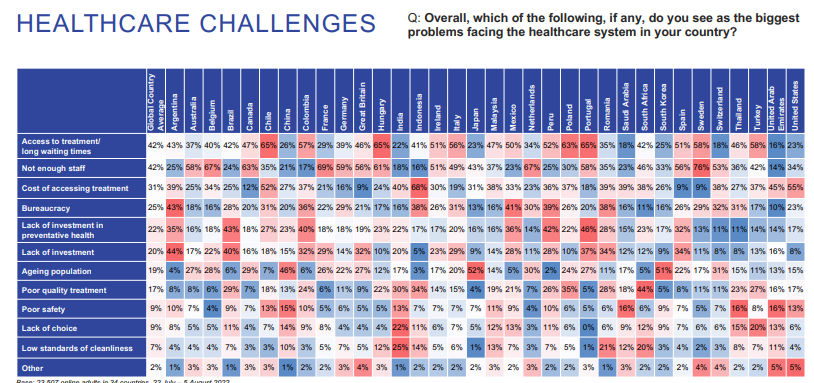
ORIGINAL PUBLICATION (excerpt)

Health Concerns
Coronavirus remains the number one concern for a third year running, mentioned by a global country average of 47%, down 23 percentage points on 2021.
Japan is the country which shows the highest level of concern about Covid-19 (at 73%), ahead of Peru (66%) in second.

Mental health has, for the first time, taken the number two spot and now succeeds Cancer when people think about health concerns in their country.
Mental health is most prevalent as a concern in Sweden (63%), Chile (62%), and Ireland (58%). It has seen a five-percentage point increase year-on-year since 2020 and currently stands at 36%.
Cancer is still a prominent concern, with just over a third (34%) perceiving it as a top worry.
The level of concern in Portugal, at 79%, is well above any other country, and by far the biggest concern in the country.
Next is Belgium, in second, where 59% single out cancer as a main healthcare concern.

Healthcare Perceptions
Though the pandemic still lingers, in most of the countries covered in the survey, more than half rate their healthcare system’s quality as “good”.
There are some outliers in Latin America and Central Europe, with
- Brazil (31%),
- Mexico (31%), and
- Peru (35%) describing their healthcare as poor.
Similarly, Hungary and Poland stand out, with significant proportions thinking their healthcare service is poor (53% and 43% respectively).
Though the pandemic still lingers, in most of the countries covered in the survey, more than half rate their healthcare system’s quality as “good”.
There are some outliers in Latin America and Central Europe, with Brazil (31%), Mexico (31%), and Peru (35%) describing their healthcare as poor.
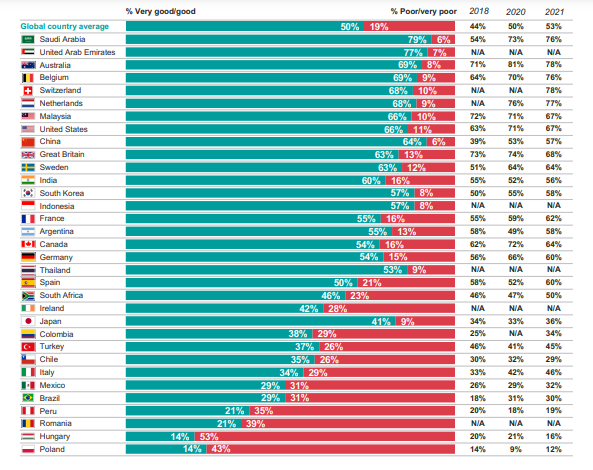
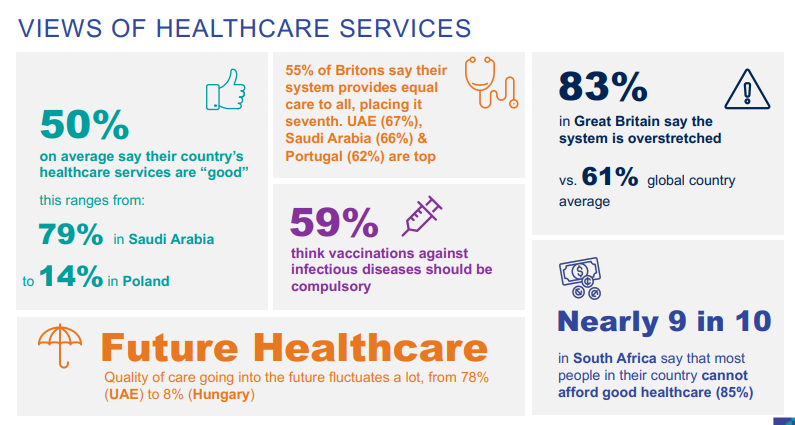
When asked to look into the future, the outlook is not entirely optimistic.
A third (33%) think the quality of healthcare in the coming years will improve and 20% see it getting worse.
Contrary to their current pessimism, people in Latin America are more optimistic about their future in relation to the rest of the world.
Colombia (71%), Brazil (62%), and Peru (59%) all see quality improving.
Meanwhile, nearly half (45%) of Hungarians think it will get worse. France (43%) and Great Britain (39%) are also negative in their forecasts.
There is widespread agreement about the pressures on individual countries’ healthcare capacity.
Three in five (61%) globally agree their system is overstretched. Newcomer Portugal ranks first at 87%, followed by Great Britain (83%) whose sense of concern has been consistent over the years.
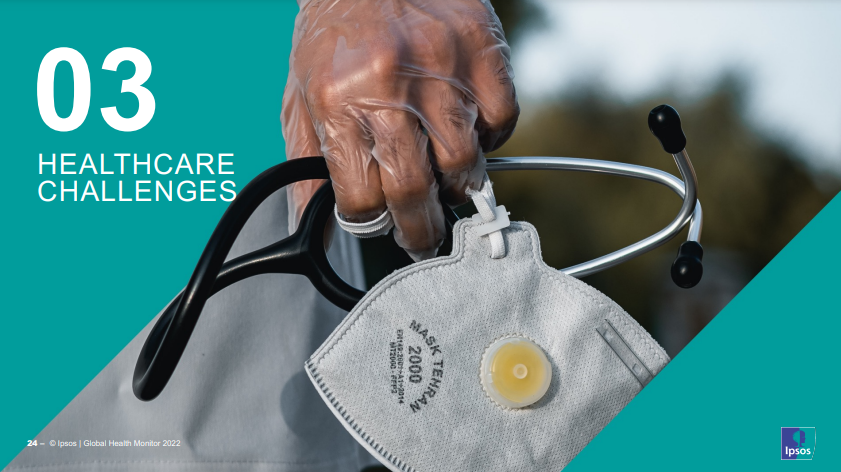
Healthcare Challenges
In conjunction with this mood that systems are overstretched, we see that access to treatment/waiting times emerge as the main perceived problems their country’s healthcare system faces — selected by a global country average of four in ten.
Not enough staff is joint first for the first time since we started asking these questions in 2018.
Cost of accessing treatment is the third most selected issue globally (31%).
While no country has bureaucracy as their top healthcare challenge, it is widely recognised among the main issues.

Waiting times are a particularly prominent concern in Hungary, Chile, and Portugal (in each country 65% single it out as a challenge).
However, this pattern does not follow when we look at where not having enough staff is a particular challenge.
Here Sweden (76%), France (69%), and Netherlands (67%) as the top countries.
Although slightly further down the list, bureaucracy is still a challenge for a quarter of respondents (25%).
Argentina has it as their joint second highest challenge at 43%, only just behind lack of investment (44%). Other LATAM countries struggling are Mexico (41%) and Peru (39%).
Outside the top issues, we see that lack of investment in preventative health (22%) and lack of investment (20%) in general rank next highest.
Ageing population is seen as a challenge in some of the Asian countries: Japan (52%), South Korea (51%), and China (46%).
Outside the top issues, we see that lack of investment in preventative health (22%) and lack of investment (20%) in general rank next highest.

About the Study
These are the results of a 34-market survey conducted by Ipsos on its Global Advisor online platform.
Ipsos interviewed a total of 23,507 adults aged 18–74 in the United States, Canada, Malaysia, South Africa, and Turkey, 20–74 in Thailand, 21–74 in Indonesia, and 16–74 in 27 other markets between Friday, July 22 and Friday, August 5, 2022.












